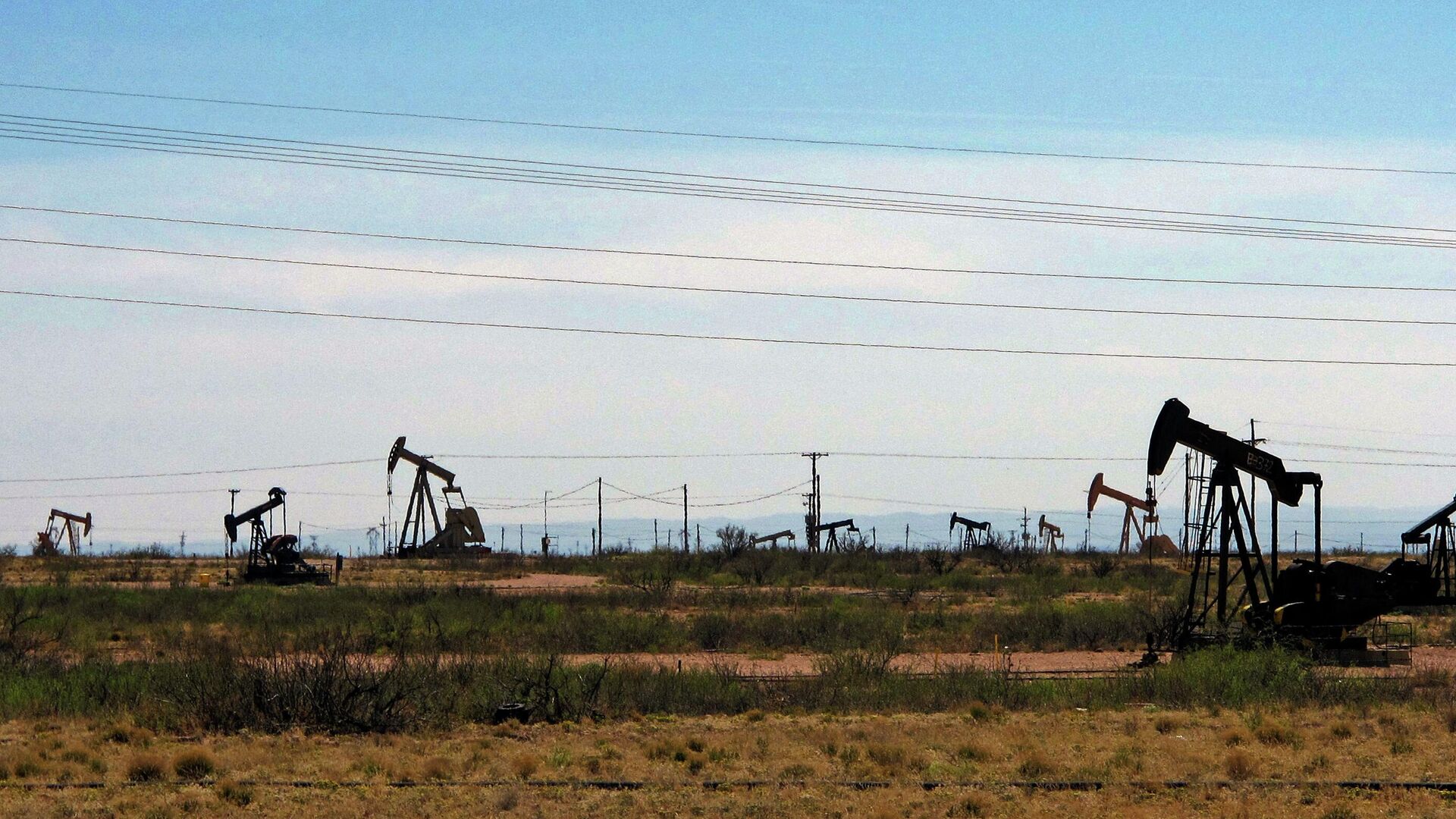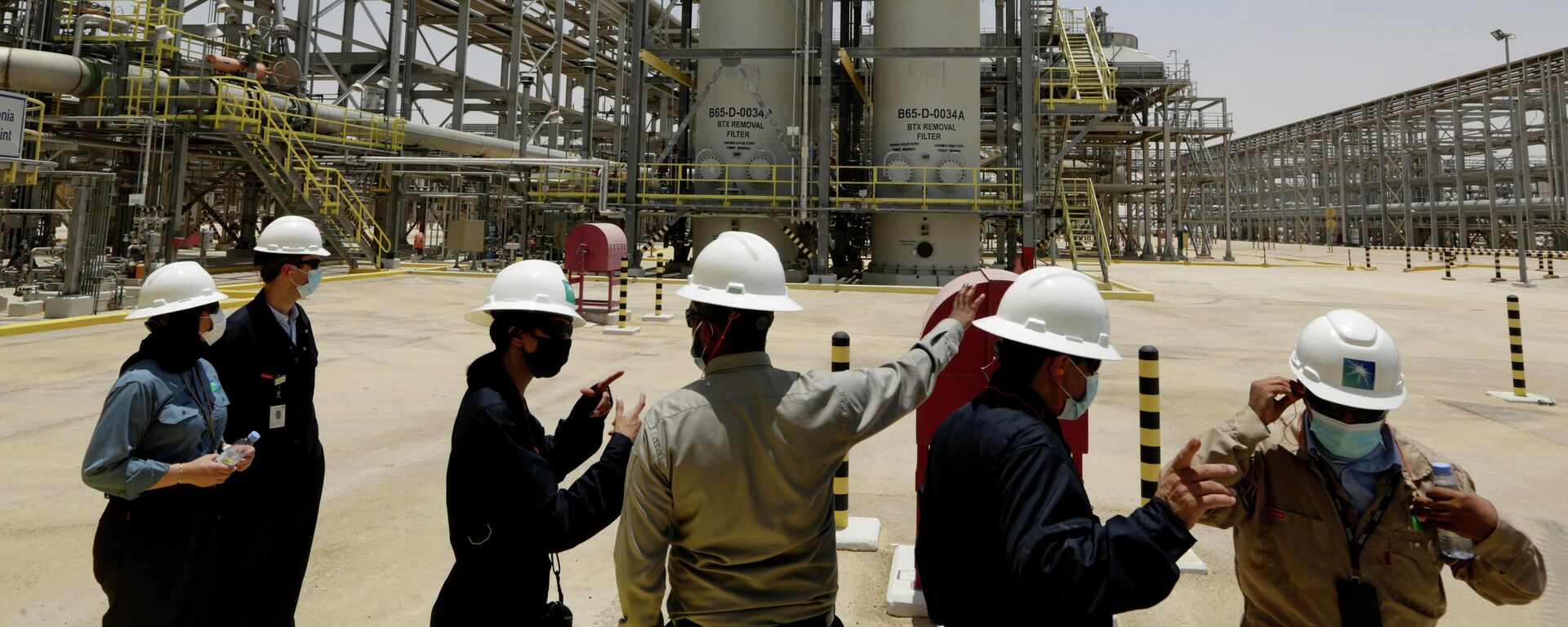https://sputnikglobe.com/20220516/oil-prices-rise-as-much-as-3-as-opec-defiant-in-not-flooding-market-with-supply-1095554806.html
Oil Prices Rise as Much as 3% as OPEC+ Defiant in Not Flooding Market With Supply
Oil Prices Rise as Much as 3% as OPEC+ Defiant in Not Flooding Market With Supply
Sputnik International
NEW YORK (Sputnik) - Crude prices rose by as much as 3% on Monday, extending their rally for a fourth straight day, as the OPEC+ alliance of global oil... 16.05.2022, Sputnik International
2022-05-16T22:03+0000
2022-05-16T22:03+0000
2022-05-16T22:03+0000
opec
oil price
saudi arabia
oil refineries
https://cdn1.img.sputnikglobe.com/img/07e6/05/10/1095554781_45:0:2841:1573_1920x0_80_0_0_c6379d9b000b1d2104a38b74be85db40.jpg
London-traded Brent crude, the global benchmark for oil, settled at $114.24 per barrel, up $2.90, or 2.4%. It sank to $109 during Asian trading hours as market participants reacted to poor economic data out of top oil importer China.New York-traded West Texas Intermediate, or WTI, crude settled at $114.20, up $3.71, or 3.4%. Earlier in the session, the US crude benchmark fell to as low as $106.28.The turnaround in crude prices came after OPEC+, which groups the original 13 members of the Saudi-led Organization of the Petroleum Exporting Countries with another ten oil exporters steered by Russia, said it will not increase output beyond the 430,000 barrels per day increases it has been doing each month since last year.The monthly OPEC hikes clearly fall short of the global demand for oil which is at least 3 million barrels per day short of demand since late March, when the West began imposing sanctions on crude from major exporter Russia.US fuel prices have hit record highs since last week, with gasoline at above $4.50 per gallon and diesel at around $6 at some pumps. Aside from a deficit in refining capacity, demand for fuel anticipated ahead of the peak summer season for travel has driven energy prices to hitherto unseen levels.Saudi Arabia’s Energy Minister Abdulaziz bin Salman told an energy conference in Bahrain on Monday that a dearth of refining capacity in the United States and elsewhere meant that gasoline and other oil products would remain expensive, even if exporters pumped more crude.Bahrain’s Oil Minister Sheikh Mohammed Bin Khalifa Bin Ahmed concurred with his Saudi counterpart, saying there is no new refining capacity coming.The United States is experiencing a severe squeeze in the supply of gasoline, and particularly diesel, from the closure and downsizing of several refineries during the coronavirus pandemic.Refineries that have stayed in the business are now providing only what they can - or, more accurately, what they desire - without putting any money into expanding existing capacity or acquiring the idled plants that can be reopened to provide some measurable relief to consumers. One motivation for the refineries to do this: record profits from the current situation that may be diluted in an expansion. The other is the long turn-around time for any new refinery to deliver a profit.Industry experts estimate that more than 1 million barrels per day of US oil refining capacity - or about 5% overall - has shut since the COVID-19 outbreak initially decimated demand for oil in 2020. Non-US refining capacity has, meanwhile, shrunk by an estimated 2.13 million barrels a day.
https://sputnikglobe.com/20220507/opec-wont-boost-oil-production-to-help-the-west-contain-rising-energy-prices---report-1095339424.html
saudi arabia
Sputnik International
feedback@sputniknews.com
+74956456601
MIA „Rosiya Segodnya“
2022
Sputnik International
feedback@sputniknews.com
+74956456601
MIA „Rosiya Segodnya“
News
en_EN
Sputnik International
feedback@sputniknews.com
+74956456601
MIA „Rosiya Segodnya“
Sputnik International
feedback@sputniknews.com
+74956456601
MIA „Rosiya Segodnya“
opec, oil price, saudi arabia, oil refineries
opec, oil price, saudi arabia, oil refineries
Oil Prices Rise as Much as 3% as OPEC+ Defiant in Not Flooding Market With Supply
NEW YORK (Sputnik) - Crude prices rose by as much as 3% on Monday, extending their rally for a fourth straight day, as the OPEC+ alliance of global oil exporters remained defiant in not raising supply to levels demanded by consuming nations.
London-traded Brent crude, the global benchmark for oil, settled at $114.24 per barrel, up $2.90, or 2.4%. It sank to $109 during Asian trading hours as market participants reacted to poor economic data out of top oil importer China.
New York-traded West Texas Intermediate, or WTI, crude settled at $114.20, up $3.71, or 3.4%. Earlier in the session, the US crude benchmark fell to as low as $106.28.
The turnaround in crude prices came after OPEC+, which groups the original 13 members of the Saudi-led Organization of the Petroleum Exporting Countries with another ten oil exporters steered by Russia, said it will not increase output beyond the 430,000 barrels per day increases it has been doing each month since last year.
The monthly OPEC hikes clearly fall short of the global demand for oil which is at least 3 million barrels per day short of demand since late March, when the West began imposing sanctions on crude from major exporter Russia.
US fuel prices have hit record highs since last week, with gasoline at above $4.50 per gallon and diesel at around $6 at some pumps. Aside from a deficit in refining capacity, demand for fuel anticipated ahead of the peak summer season for travel has driven energy prices to hitherto unseen levels.
Saudi Arabia’s Energy Minister Abdulaziz bin Salman told an energy conference in Bahrain on Monday that a dearth of refining capacity in the United States and elsewhere meant that gasoline and other oil products would remain expensive, even if exporters pumped more crude.
Abdulaziz’s remarks form a now familiar OPEC+ line that there are “physical impediments that no producer can solve.” He told the Bahrain conference: “There is no refining capacity commensurate with the current demand and the expectation of the demand in the summer.”
Bahrain’s Oil Minister Sheikh Mohammed Bin Khalifa Bin Ahmed concurred with his Saudi counterpart, saying there is no new refining capacity coming.
"Even if you produce more crude, there isn’t demand for it, there aren’t any more refineries,” he said.
The United States is experiencing a severe squeeze in the supply of gasoline, and particularly diesel, from the closure and downsizing of several refineries during the coronavirus pandemic.
Refineries that have stayed in the business are now providing only what they can - or, more accurately, what they desire - without putting any money into expanding existing capacity or acquiring the idled plants that can be reopened to provide some measurable relief to consumers. One motivation for the refineries to do this: record profits from the current situation that may be diluted in an expansion. The other is the long turn-around time for any new refinery to deliver a profit.
Industry experts estimate that more than 1 million barrels per day of US oil refining capacity - or about 5% overall - has shut since the COVID-19 outbreak initially decimated demand for oil in 2020. Non-US refining capacity has, meanwhile, shrunk by an estimated 2.13 million barrels a day.




